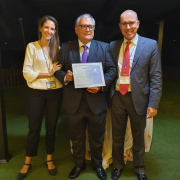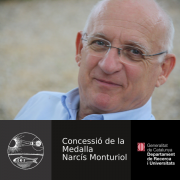Candidatos a la Comisión Ejecutiva de SEMNI
/en noticias, Uncategorized/por ecuetoDe acuerdo con el calendario que se he enviado a todos los socios, ya estamos en condiciones de hacer pública la lista de candidatos a la Comisión Ejecutiva. Estos son, por orden alfabético:
Nombre | Apellido | Mensaje |
| Rena | Chengxiang Yu | |
| Elías | Cueto | |
| Pedro | Diez | |
| Esteban | Ferrer | [Descargar] |
| Francisco Javier | Montans | |
| José | París López | [Descargar] |
| Juan José | Ródenas García | |
| Riccardo | Rossi | [Descargar] |
| Javier | Segurado | [Descargar] |
En breve se enviarán las credenciales para poder ejercer el derecho a voto.
Elecciones a la Comisión Ejecutiva de SEMNI
/en noticias, Uncategorized/por ecuetoQueridos compañeros,
De acuerdo con los estatutos de la Sociedad Española de Mecánica e Ingeniería computacionales (SEMNI), procede renovar los seis miembros de la Comisión Ejecutiva que finalizan su mandato en 2022: Elías Cueto, Pedro Díez, Francisco Javier Montáns, Juan José Ródenas, Riccardo Rossi, Chengxiang (Rena) Yu. La votación se llevará a cabo de manera electrónica a través de una aplicación abierta a tal efecto en la página web de SEMNI. Cada miembro de SEMNI con derecho a voto recibirá un correo electrónico con las instrucciones y sus claves personales de acceso a dicha aplicación. Se abre el siguiente proceso electoral:
- Plazo para la presentación de candidaturas mediante correo electrónico remitido a la Secretaría de SEMNI (*): desde el 14 hasta el 25 de noviembre de 2022. Podrán votar y/o presentarse como candidatos los miembros al corriente de su cuota de socio.
- Notificación de candidatos e inicio del periodo de campaña electoral a través del canal de noticias de SEMNI (**): 28 de noviembre de 2022.
- Fin del periodo de campaña electoral y apertura del periodo de votación electrónica a través de la web de SEMNI: 2 de diciembre de 2022 11:00 (hora local de Barcelona).
- Fin del periodo de votación electrónica: 13 de diciembre de 2022 15:00 (hora local de Barcelona).
- Publicación de resultados: 14 de diciembre de 2022.
Un fuerte abrazo,
Irene Arias Vicente
Secretaria General SEMNI
(*) e-mail:
(**) envío de mensaje/es de los candidatos, para difusión al cuerpo electoral mediante el canal noticias SEMNI, a la secretaría de SEMNI:
Convocatoria de premios anuales SEMNI
/en noticias, Uncategorized/por ecuetoQueridos compañeros,
Como cada año, SEMNI convoca sus premios a la mejor tesis doctoral defendida durante 2022 y al joven investigador, premio Juan Carlos Simó.
Adjuntas encontraréis las bases de dichos premios:
Mejor tesis doctoral: https://semni.org/wp-content/uploads/2022/11/PremioSEMNI_MejorTesisDoctoral2022.pdf
Premio Juan C. Simó: https://semni.org/wp-content/uploads/2022/11/PremioJCS-2023_InvestigadorJoven.pdf
Tratándose de premios a nuestros miembros más jóvenes, os rogamos la máxima difusión entre ellos.
Recibid un cordial saludo,
Elías Cueto
Plaza post-doctoral en la Universidad de Zaragoza
/en Ofertas de trabajo/por ecuetoPOST-DOCTORAL POSITION WITHIN THE PROJECT
«Physics-informed Artificial Intelligence for Cognitive Twins of Complex Systems»
The Applied Mechanics and Bioengineering (AMB) group of the University of Zaragoza (see http://amb.unizar.es) is one of the leading groups within the computational mechanics community at a national and European levels, comprised by 20 senior faculty members and a variable number of Ph.D. students and post-doctoral associates.
The group has a broad experience in the development of advanced simulation techniques such as meshless methods, model order reduction and, more recently, scientific machine learning for the simulation of complex, multi physics and multiscale phenomena.
With the recently awarded project Physics-informed Artificial Intelligence for cognitive twins of complex systems we aim at developing novel tools for the machine learning of complex physical phenomena with guaranteed physical meaning.
In the frame of this emergent project in the group, we seek a highly motivated postdoctoral candidate to develop and implement artificial intelligence tools able to achieve physical perception and reasoning about complex physical phenomena taking place in the neighborhood of this AI.
ROLE SUMMARY:
The candidate, in close collaboration with profs. E. Cueto, D. González, I. Alfaro, and the rest of the team, will develop advanced AI techniques based on physics-informed neural networks towards the creation of cognitive digital twins, able to understand the surrounding environment and adapt to changing scenarios.
CONTRACT DETAILS:
Applications/interviews: Please send an email expressing your interest, together with a CV to Prof. Elías Cueto (). Reviews of applications will continue until the position is filled.
Initial date: As son as possible.
Duration: 2 years.
Dedication: Full-time, 40 h/week.
Gross annual salary: 42983 € (including Spanish public health and social security benefits).
SKILLS / QUALIFICATIONS:
Hard / Essential:
• PhD in Computational Continuum Mechanics (or similar), with a strong numerical focus on mathematical modeling.
• In-depth, hands-on knowledge of modeling software and computer programming (MATLAB, Python, C/C++, Fortran) as well as of the Finite Element Method and its procedures.
Hard / Desirable:
• Knowledge about neural network programming (preferably, PyTorch).
• Knowledge on Computer Vision.
• Computational Solid Mechanics.
• Image Processing and Data Analysis.
Soft / Essential:
• Keen interest in learning novel computational methods.
• Self-directed with the ability to work independently.
• At the same time, ability to work in group and (co-)advise doctoral students.
• Excellent communication and writing skills in English.
CONTACT:
If interested, please send your CV, a cover letter, and a reference letter to Elías Cueto ().
Premios SEMNI 2021
/en noticias, Uncategorized/por ecuetoEn el CMN celebrado en Las Palmas los pasados 12 a 14 de setiembre, SEMNI tuvo el placer de otorgar los premios anuales que distinguen a nuestros miembros más destacados. Visitad la página de premios https://semni.org/premios/ para ver lista de premiados. ¡Enhorabuena a todos ellos!
Oferta de tesis en Purdue
/en Ofertas de trabajo/por ecuetoPhD positions at Purdue – Computational biomechanics and fluid dynamics
We have several openings for a PhD positions. The successful candidate will conduct original research in the general area of biomechanics and fluid dynamics. They develop numerical methods to model coupled processes on high-performance computing platforms. This position is in the Gomez Research Group (https://engineering.purdue.edu/gomez/) in the Department of Mechanical Engineering at Purdue.
Applications
Please send an email expressing your interest, together with a CV to Prof. Hector Gomez (). Reviews of applications will start on October 14, 2022 and continue until the position is filled.
Information
You may find some information about Purdue University at https://www.usnews.com/best-graduate-s hools/top-engineering-schools/eng-rankings
Oferta de tesis en CIMNE
/en Ofertas de trabajo/por ecuetoA PhD position is open in the Large Scale Scientific Computing group
at the International Center for Numerical Methods in Engineering (CIMNE)
and Universitat Politècnica de Catalunya (UPC BarcelonaTech).
The position is funded by the project AMBBOS, Advanced computational
Mathematics for Breeding Blanket Optimal deSign, a 3-year Spanish
project focused on the development of numerical methods for the
optimal design of breeding blankets (BB) in fusion reactors.
BB (https://en.wikipedia.org/wiki/Breeding_blanket) devices are a key
component of fusion reactors that provide radiation shielding from neutrons,
heat extraction and tiritum regeneration (breeding). Testing BB designs
is one of the goals of ITER (https://www.iter.org/proj/inafewlines)
possibly the biggest energy projects in the world.
Most BB concepts are based on a flow of molten led-lithium (Pb-Li)
that circulates under a strong magnetic field used to confine the plasma.
Because experiments are difficult to perform, specially in real operating
conditions, computational methods for BB design are urgently needed.
These methods need to address a robust shape optimization problem that
involves a magnetohydrodynamic flow, possibly with thermal instabilties.
There are several computational challenges that will be address during the
project, including solving large systems of equations for implicit time
integration, using embedded methods for the description of the geometry,
perform validation and verification of the models against available data
(which may require machine learning methods) and wrapping the model in a
robust optimization loop with the computation of shape sensitivites.
The developed methods will be implemented in the Julia programming
language, using the Gridap ecosystem as a basis (https://github.com/gridap)
and will exploit high performance computing resources.
Candidates should hold a degree in mathematics, engineering, computer
science, or physics and an excellent academic record. They also should have
good writing and communication skills including a high English level.
Expertise in software development tools (debugging, git/github),
linux/unix environments and functional or object-oriented programming
as well as parallel programming will be an important asset.
Knowledge of computational fluid dynamics (ideally related to magnetohydrodinamic
flows), finite element modeling and/or optimization will also be positively considered.
Applications will be considered untill the position will be filled, so it
is advised to send them as soon as possible. Please send your application
(with academic record) and inquires to
Javier Principe, UPC BarcelonaTech & CIMNE
Francesc Verdugo, VU Amsterdam
Xavier Oliver, medalla Narcís Monturiol
/en Uncategorized/por ecuetoNuestro compañero y ex-presidente, el prof. Xavier Oliver acaba de ser galardonado con la medalla Narcís Monturiol al mérito Científico y Tecnológico de la Generalitat de Catalunya. La medalla premia su contribución al desarrollo de la ciencia y la tecnología. El premio lleva el nombre del inventor y político catalán del s. XIX Narcís Monturiol Estarriol (1819-1885).
¡Nuestra más sincera enhorabuena en nombre de toda la comunidad que forma SEMNI!
Tenéis todos los detalles en https://actualitat.camins.upc.edu/es/node/8215
Suscríbete a nuestra lista de correo
Rellena un pequeño formulario aquí si deseas recibir nuestras noticias.
Follow us in LinkedIn












